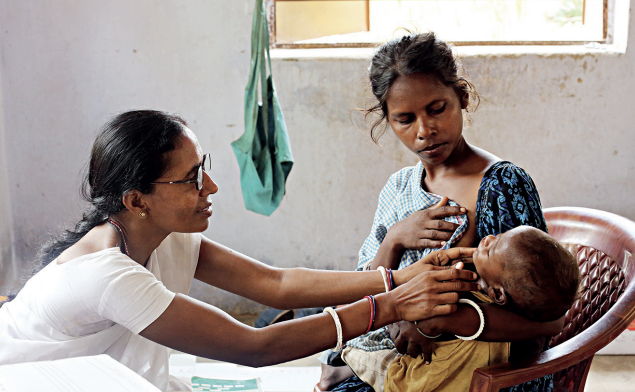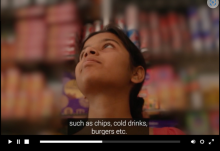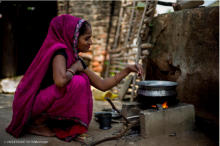Community based programme for children below 5 years of age with severe acute malnutrition in India

Community based programme for children below five years of age with Severe Acute Malnutrition (SAM) is based on the principle that if acute malnutrition is identified in the early stages, treatment can be provided at community level and medical complications in these children will be averted. Key to the success of the approach is timely detection and admission into a treatment programme before the metabolic and immunological aspects become marked and require inpatient treatment.
Government of India has set up Nutrition Rehabilitation Centres (NRCs) in inpatient health facilities across the country for treatment of children with SAM and medical complication. However, only an estimated 10-15% of children with SAM are medically complicated and require inpatient treatment. Evidence shows that the remainder (85-90% of children with SAM) can be treated at community level. Community-based care is linked with facility-based care; children developing medical complications are referred to the nearest Nutrition Rehabilitation Centre for clinical management of SAM, while those discharged from NRCs are enrolled into the community-based programme for continuation of care and nutrition rehabilitation.
Effective management of SAM must be based on the basic principle of ‘Continuum of Care’ from the home and community to the health centre / health facility and back again. Since the launch of the POSHAN Abhiyaan by the Hon’ble Prime Minister in 2018, there is an unprecedented momentum and interest from states as well as many districts to implement comprehensive programme for identification and treatment of children with SAM, and to explore opportunities for strengthening elements of SAM care within the existing Government programme. While states are waiting for the National guidance to be issued by the Ministry of Women and Child Development on community-based management of children with SAM, they are using state funds for rolling out the community-based programme in selected geographic area or across the state.
Since March 2020, due to COVID-19 pandemic, regular ICDS and Health-services have been severely constrained. Optimal care for children, especially those who are malnourished has been disrupted. With COVID-19 outbreak, massive disruptions in continuity of food availability and livelihood are anticipated. The situation may increase the overall SAM burden in the country. The urgent need of this hour is to bring SAM management under the fold of essential health and nutrition services and to ensure continuity of services for the management of child wasting.
This report highlights state wise status of community-based programme for management of SAM cases in 12 states where UNICEF has presence.




